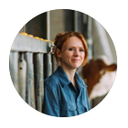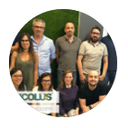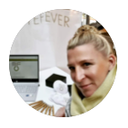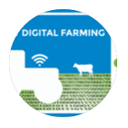The magnitude
The SmartAgriHubs ecosystem is gender-balance aware and strives to be inclusive.
Click on the connected dots to see what they have to say about it!
Our community goes beyond our project - from Digital Innovation Hubs to other H2020 projects, discover the Magnitude of SmartAgriHubs.

RC: North-West Europe
Name: Kristine Piccart
Company: CowCoach, Digital Innovation Hub

RC: Ireland & UK
Name: Deborah Crossan, Soil & Water Manager
Company: Innovation for Agriculture (IfA), Digital Innovation Hub

RC: RC Italy & Malta
Company: Start-up: Agricolus s.r.l, loT Technology Provider

Name: Gaia Amatteis, Program Manager
Company: RootCamp GmbH, Digital Innovation Hub and Competence Center

RC: North-West Europe
Name: Andrea Staudler
Company: HORDI, Digital Innovation Hub

RC: North-West Europe
Name: PD Dr. Merve Wollweber
Industrial and Biomedical Optics Department
Head of Food and Farming Group
Company: Laser Zentrum Hannover e.V., Digital Innovation Hub

“Men and women work in different areas of the agri-food sector. Smart farming techniques available in ALL areas will support an enhanced gender equality.”
RC: Scandinavia
Name: Kristina Anderback
Company: SmartAgri, Agroväst Livsmedel AB, Digital Innovation Hub

RC: North_West Europe
Name: Camille Maeselle, Founder of Tastefever
Company: Tastefever, Digital Innovetion Hub, Start-up

Name: Harris Moysiadis
Company: Hellenic FIWARE iHub, Digital Innovation Hub

RC: North-West Europe
Name: Bart Minne
Company: Smart Digital Farming, Digital Innovation Hub

Name: Antonios Sokratis Kaprelis
Company: Neuropublic AE, IoT Technology Provider

Name: Ana-Maria Stancu
Company: Bucharest Robots - SmartAgro Digital Innovation Hub

Company: Trace Labs Group, IoT Technology Provider
RC: North-West Europe
Name: Kristine Piccart
Company: CowCoach, Digita Innovation Hub
“Diversity and inclusion accelerate innovation. We need different viewpoints and experiences to tackle the present issues in agrifood systems.”
RC: Ireland & UK
Name: Deborah Crossan, Soil & Water Manager
Company: Innovation for Agriculture (IfA), Digital Innovation Hub
“To regenerate a failing Agri-food sector, we need to champion the female strengths of compassion, connection, and resilience, to ensure food security for the world. “
RC: Italy & Malta
Company: Start-up: Agricolus s.r.l, loT Technology Provider
“Women contribute to agricultural and rural development every day, especially in low-income countries. It is important to let them participate in developing solution to transform the agrifood system.”
RC: North-West Europe
Name: Gaia Amatteis, Program Manager
Company: RootCamp GmbH, Digital Innovation Hub and Competence Center
Why is gender equality in the agri-food sector important to you?
Historically agriculture has been dominated by men and in some developing countries women are not legally allowed to own land. So it is all about ensuring the same opportunities in terms of education, rights and access to capital for all, irrespective of their gender.
What does gender equality in the agri-food sector mean to you?
For me it means the same education, the same rights and the same opportunities.
As the sector becomes less dependent on physical capabilities and more focused on strategic management and technical solutions, women could play a more significant role. However the number of female STEM students is lower than in other areas.
Also according to the recent numbers, access to capital is still very low for female founders and those companies are dominated by men too.
How can gender equality in the agri-food sector be improved?
Education and action. Progress has been made and some initiatives are working to close this gap. The EU is providing rural development funds to help young women get started in farming; and the World Bank has launched a webinar series for ‘Women Leadership in AgTech’ in its efforts to transform the sector.
Venture capitalists and financial institutions should put policies in place to close this gap. Personally, I hope to see more female founders applying for our acceleration programs.
RC: North-West Europe
Name: Bart Minne
Company: Smart Digital Farming, Digital Innovation Hub
“Gender equality, in any sector or situation, is a non-issue to me, it should not even be part of a discussion. By which I mean, that it is logical, mandatory and to be considered as a basic human right that everyone should be treated equally, regardless of a person’s gender. However, I know this is currently not the case, but it should. I am often baffled by the stories and experiences people in our, or other sectors, have to deal with on a regular basis. There is a lot of work to be done, and it starts with every individual, your daily actions/choices often have more impact on the people around you than most of us understand.”
RC: North-West Europe
Name: Andrea Staudler
Company: HORDI, Digital Innovation Hub
“There are many women working in the agrifood sector, but only a few of them manage farms. It is important to increase this proportion significantly!”
RC: North-West Europe
Name: PD Dr. Merve Wollweber
Industrial and Biomedical Optics Department
Head of Food and Farming Group
Company: Laser Zentrum Hannover e.V., Digital Innovation Hub
“Gender equality and gender diversity go hand in hand and diverse perspectives to current challenges in the agri-food sector are core drivers of innovation.“
RC: Scandinavia
Name: Kristina Anderback
Company: SmartAgri, Agroväst Livsmedel AB, Digital Innovation Hub
“For me, equality means that men and women are given the same conditions to succeed in work life without being limited by notions of gender.”
And
“Men and women work in different areas of the agri-food sector. Smart farming techniques available in ALL areas will support an enhanced gender equality.”
RC: North-West Europe
Name: Camille Maeselle, Founder of Tastefever
Company: Tastefever, Digital Innovetion Hub, Start-up
“I believe in personal qualities and in using them to make from our passion, our happiness and our work, regardless of our gender and sector.”
RC: South-East Europe
Name: Harris Moysiadis
Company: Hellenic FIWARE iHub, Digital Innovation Hub
Why is gender equality in the agri-food sector important to you?
Agriculture needs to face the coming severe challenges to ensure people sustainability in this world. Thus, it needs all of humanity to unite, away from discrimination, inequality and resources’ overuse.
How can gender equality in the agri-food sector be improved?
Gender equality in the agri-food sector can lead to optimised productivity. The introduction of digital technologies might make agriculture less labour-intensive- so more appealing to people with less physical strength- while the focus on value chain niches require new skills often encountered in both genders (communication, organisation, administration).
RC: South-East Europe
Name: Antonios Sokratis Kaprelis
Company: Neuropublic AE, IoT Technology Provider
Why is gender equality in the agri-food sector important to you?
Gender equality proves to be an essential factor, among others, in order to achieve sustainability in agriculture and improve our capacity to adapt to climate change; according to FAO estimates, closing the gender gap would boost agricultural production by 2.5 – 4 % globally and reduce hunger by up to 17%.
How can gender equality in the agri-food sector be improved?
Addressing gender equality should be considered as part of the “social contract” associated with investments in agriculture – in that way, stakeholders should develop and adopt with partners along the value chain an explicit gender strategy for the empowerment of women.
RC: South-East Europe
Name: Ana-Maria Stancu
Company: Bucharest Robots - SmartAgro Digital Innovation Hub
Why is gender equality in the agri-food sector important to you?
First of all, gender equality is important in any sector, not just in the agri-food sector because it is about the equal rights of all citizens to activate in any field.
The importance of women in the agricultural industry is important, as in any other industry. Because they can bring in potentially different insights and involvement. Like in any other fields it is important to also have this input since they come from over 50% of the population.
How can gender equality in the agri-food sector be improved?
We can improve gender balance in the agri-food sector by awareness campaigns and changing the view that this is a sector for men only. Especially in the age of robotics and automation, we can no longer say that it is a hard labour job and that women can not do it. They can also act as managers or even smart tractors operators.
We can promote women that are already active in the sector or we can organize education programs for girls in this fields, similar to this one: https://e-civis.eu/en/agritech-camp-en/
RC: South-East Europe
Company: Trace Labs Group, IoT Technology Provider
Why is gender equality in the agri-food sector important to you?
Gender equality in the agri-food sector is important because female voices can contribute and create a meaningful impact in the sector from being marketers and communications representatives to developers. We should support different opinions and views on different subjects that bring solutions and resolve challenges within the sector.
How can gender equality in the agri-food sector be improved?
Gender equality in the agri-sector can be improved by letting women take on more responsibilities and give them the ability to make impactful decisions.
National Research Council Italy (HyFlexyBot IE Mentor)
IE Name: HyFlexyBot
The HyFlexyBot robotic solution can play a vital role in ensuring quality and safety of food products, covering the end-user's needs related to logistics, especially in terms of picking, packing and palletising products. The HyFlexyBot project aims to design, implement and demonstrate the effectiveness of a pioneering concept of fully integrated Autonomous Mobile Manipulation Robot (AMMR), combining an autonomous robotic arm with an autonomous mobile robot (AMR), for a full non-contaminating production and palletisation food process.
The HyFlexyBot AMMR represents a suitable solution to handle food in a clean environment and increase the safety of the final consumer, preserving hygiene and avoiding contamination by workers.
Country: Italy
Sector: Food Processing
Type of Provided Service: Technology Support to R&D&I, Matchmaking, Dissemination
Short bio of the mentor: Vito Trianni
Vito Trianni is a senior researcher at the Institute of Cognitive Sciences and Technologies of the Italian National Research Council (ISTC-CNR). His research focuses on swarm intelligence, with particular emphasis on the design and analysis of complex self-organising systems and robot swarms. Precision agriculture represents an ideal application domain for multi-robot systems and swarm robotics, demanding for novel approaches that can leverage innovation in AI, control and robot coordination. The strong research experience in robotics and AI informs the activities of the DIH of the National Research Council (CNR), which offers services in technology design and evaluation, as well as in services to support networking with the Italian agricultural and industrial ecosystem.
Main activities, main results and role of the mentor
Automationware is an Italian manufacturer specialised in advanced mechatronics and electric actuators for industrial solutions in many market sectors. With HyFleyBot, they want to hit the robotics market, proposing an innovative solution that combines a mobile holonomic ground platform with a powerful arm that can reach out to 180 cm and lift as much as 20 kg. The versatility and precision of the HyFlexybot solution makes it an ideal platform for several operations in the food market (picking, packing, palletising) and beyond. As a matter of fact, the HyFlexyBot solution is attracting interest of several food producers and vertical farms technology providers in Italy and Europe.
During the development phase, the main components of the AMMR have been assembled and tested. The electro-mechanical joints produced by Automationware can be assembled in different configurations, allowing to customise the robot arms in weight and power, according to the application need. The mobile base features 4-wheel drive propulsion with the possibility of adjusting the wheel at 360 degrees (8 effective axes), making it ideal for moving in restricted areas in support of the arm operations. From the software point of view, the system is driven by a ROS platform composed by a PC embedded in the base. The board is connected via WIFI to the master control system based in ROS and defined by a new middleware platform that incorporates the navigation for the AGV and the robotic arm control.
HyFlexyBot has benefited from continuous mentoring from the DIH of the CNR, providing support during the design and development phase to identify possible ways of improvement. Thanks to such mentoring, various technical and business support services were provided. For instance, a technical service was provided to address a real-time control issue, which was spotted and solved. Matchmaking service was provided to identify expertise within the agROBOfood network (from Fraunhofer IPA). This has allowed HyFlexyBot to enter the testing phase without any technical issue, demonstrating yet another time how important it is for SMEs to be linked to a large network of DIH harnessing its rich and diverse expertise.
A piece of advice from the mentor
"Always challenge the assumptions at the basis of the proposed innovation. Solutions that are more efficient, faster or cheaper can be easily attained if some assumptions are changed, relaxed or removed. Be an attentive listener, but speak out loud and clear when it’s time to raise your points, without being afraid of putting into questions the choices previously made by the innovator SME."